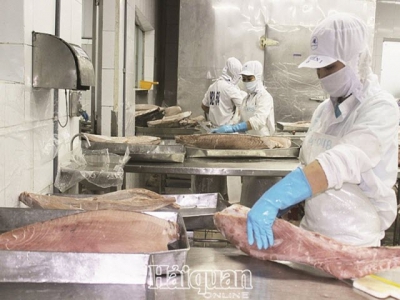Prices of fish, shrimp flourishes and seafood exports will reach US$9.6 billion

Instead of reducing prices during the first threequarters of the year, recently, prices of shrimp and pangasius have gradually increased. Per forecasts, total seafood export value will reach about US$9.4-9.6 billion for the whole year.
Processing seafood for export. Photo: Thu Hoa
Prices of fish and shrimp have declined
According to the General Department of Fisheries (Ministry of Agriculture and Rural Development), in the first 10 months, the export of seafood reached $7.084 billion (down by 2.0 percent compared to the same period in 2018). In particular, price of shrimp reached $2.78 billion (down by 6.4 percent), price of pangasius reached$1.64 billion (down by 10 percent).
The remarkable thing in aquaculture and seafood export since the beginning of the year is that the price of two key products including shrimp and pangasius has been decreasing for months.
Specifically, the low price of raw shrimp from the beginning of March to August has affected the export turnover of the whole industry (the price of frozen vannamei shrimp decreased by VND15,000-20,000/kg compared to the same period last year).
Since the end of March, pangasius price have also decreased continuously, currently maintaining at VND20,500-21,500/kg (down VND5,000-8,000/kg compared to the same period in 2018).
Regarding to the price reduction of key export seafood products of Vietnam, Tran Dinh Luan, Director General of the General Department of Fisheries said that for brackish water shrimp, some countries such as India and Ecuador continue to enjoy shrimp seasons, low production costs and abundant supplies. These factors have affected the domestic price of shrimp.
Besides, raw shrimp production costs of Vietnam is still higher than other countries. Some enterprises import cheaper raw shrimp from India, leading to competition and oversupply in the domestic raw shrimp market.
In addition, the Chinese market has tightened management of cross-border imports; strengthened quality control, food safety and traceability while many Vietnamese enterprises are subjective and do not meet requirements.
Regarding pangasius, Tran Dinh Luan said: The price of raw pangasius material has maintained at high level in twoyears from 2017 to 2018, so it has boosted production. Many businesses and farms invest resources to expand commercial farming areas in some localities that have potential to contribute to increasing supply to the market, reducing price due to oversupply.
In addition, other pangasius farming countries such as Indonesia, China and Bangladesh have invested in developing the pangasius industry, notablyIndonesia started to build and promote the clean pangasius products and dominate the Middle East market.
“Another reason is that Saudi Arabia remains closed to Vietnamese seafood products, including pangasius. China tightened the inspection of quality, origin of goods for shipments exported across the border from June 1, 2019, so pangasius exporters have not yet been able to respond,” said head of the General Department of Fisheries.
The exports reach over $9 billion
After price reduction, shrimp prices have risen again. The EU is increasing seafood purchases in the last months of 2019. Other markets such as Canada, Japan and South Korea are also growing.
For the pangasius industry, at present, the price of commercial pangasius has increased by VND500-1,000/kg compared to the middle months. As a rule, at the end of the year, there will be many orders to serve year-end demand. Therefore, the forecast of commercial pangasius prices in the last months of 2019 and early 2020 can maintain at the current level.
"In addition, processing enterprises can be proactive inraw fish supply at the end of 2019 and early 2020, so the shortage of raw materials is less likely to occur,”said Tran Dinh Luan.
It is expected, this shrimp export of the year will reach $4.1 billion; pangasius reached $2.3 billion and seafood reached $3-3.2 billion. Thus, total seafood export turnover of the whole year is about $9.4-9.6 billion.
To help the production and export of Vietnamese seafood products develop stably, the Vietnam Association of Seafood Exporters and Producers (VASEP) said the shrimp industry, in the short and long-term, must create a certified source of clean shrimp at competitive prices.
Therefore, it needs the support of the Ministry of Agriculture and Rural Development and the General Department of Fisheries in controlling the shrimp-raising products andpreventing illegal sources of shrimp-raising chemicals which are not in the permitted list.
For the pangasius industry, to balance supply – demand and avoid oversupply, it is necessary to have complete and cumulative industry data to assess the situation, apply digitisationand provide directional information for the industry.
In addition, it is necessary to strengthen seed control stage to ensure quality, focus on the quality of fish exported to the Chinese market and promote official export and restrict unofficial trade. For the EU, it needs more support from experts and external resources to promote marketing.
For the seafood industry, the representative of VASEP saidthe State should re-plan the offshore fishing fleets because the current number of effective fishing boats is only 30-40 percent, the rest are at a loss or must lie on the shore; have a stable policy of importing raw materials to create conditions for export processing enterprises.
Có thể bạn quan tâm
 Shrimp exports still declining
Shrimp exports still declining Shrimp exports to many major markets sharply decreased, causing shrimp export turnover in 2019 to fall and making it difficult to achieve the plan.
 Diving deep into restorative aquaculture
Diving deep into restorative aquaculture How tech is transforming our understanding of the ecological benefits delivered by New England’s renowned shellfish farming sector
 Shrimp exports slide further in 2019, better outlook expected next year
Shrimp exports slide further in 2019, better outlook expected next year Vietnam’s shrimp exports continued to shrink over the last 11 months in the face of fierce competition from other major exporters.